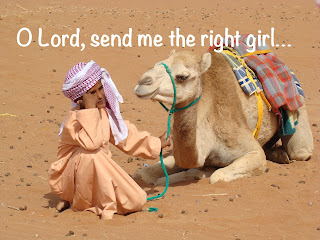What Marriage Models
 |
| Pixabay |
Here’s one answer: “A camel can go without water for days or even months. The amount of water a camel drinks varies with the time of year and with the weather. Camels need less water in winter when the weather is cool and the plants they eat contain more moisture than in summer. Camels that graze in the Sahara can go all winter without water and may refuse to drink if water is offered to them. But a large, thirsty camel can drink as much as 200 litres a day. This water is not stored in the camel's body but replaces water previously used up.” (http://camelfarm.com/camels/camels_life.html)
In Genesis 24 we read the story of the servant who was commissioned to find a bride for Abraham’s son, Isaac. His instructions were to go back to Abraham’s relatives and find a girl from among the family. A pagan bride was not acceptable and Isaac was not to go back to a pagan country and search for himself (Genesis 24:3, 8, 37).
The servant took with him ten camels loaded with gifts for the bride-to-be and her family. As the man approached the home of Abraham’s family he prayed that God would direct him to the right girl (a VERY wise move). The “winner” would be willing to draw water for a stranger AND his camels.
Rebekah came along and offered to draw water for the man—and for his camels. If they had arrived at the watering hole on “empty” Rebekah would have had to draw about 530 gallons of water to satisfy their thirst!
This gal is a keeper! On discovering that Rebekah was a member of Abraham’s extended family, the servant responded with this prayer of thanksgiving: “Then the man bowed down and worshiped the Lord, saying, ‘Praise be to the Lord, the God of my master Abraham, who has not abandoned his kindness and faithfulness to my master. As for me, the Lord has led me on the journey to the house of my master’s relatives’” (Genesis 24:26, 27).
The camel watering thing was a test—a hard worker is a good thing to have in a mate. But the more important lesson here comes from Abraham’s instruction to his servant about who an acceptable bride for Isaac would be.
She was to be someone brought up according to the same belief system as Isaac—a follower of Yahweh. She was not to be an unbeliever. Abraham was certain enough that among his family members there would be a girl who would meet this qualification.
This was always God’s standard for His people. They were not to intermarry with those who were not believers. This injunction is carried through into the New Testament.
Paul writes in 2 Corinthians 6: “Do not be yoked together with unbelievers. For what do righteousness and wickedness have in common? Or what fellowship can light have with darkness? What harmony is there between Christ and Belial? What does a believer have in common with an unbeliever? What agreement is there between the temple of God and idols? For we are temple of the living God. As God has said: ‘I will live among them and walk among them, and I will be their God, and they will be my people.’ ‘Therefore come out from them and be separate, says the Lord. Touch no unclean thing, and I will receive you.’ ‘I will be a Father to you, and you will be my sons and daughters, says the Lord Almighty.’” (6:14-18). These last are quotes from Isaiah 52:11; Ezekiel 20:34, 41; 2 Samuel 7:14, 8.
Marriage is a sacred trust, designed to model the relationship between Christ and the believer. For a believer to commit himself or herself to a non-believer is to muddle the model and to present to the world a falsehood. “Alternative facts” are a slap in the face to the God of perfect Truth, and an act of rebellion to a clear command of Scripture.



Comments
Post a Comment